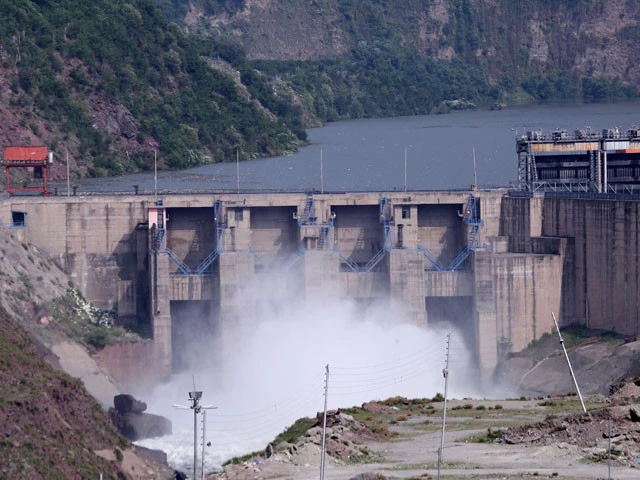Pakistan welcomes Court of Arbitration Award affirming IWT rights
Court declares India must 'let flow' waters of western rivers for Pakistan's unrestricted use

Pakistan has welcomed an Award issued by the Court of Arbitration on August 8, interpreting key aspects of the Indus Waters Treaty (IWT), calling the decision a significant affirmation of its rights over the Western Rivers.
The ruling, made public on the Court’s website Monday, clarifies the criteria for new run-of-river hydropower projects India plans to construct on the Chenab, Jhelum, and Indus rivers.
In a major finding, the Court declared that India must “let flow” the waters of the western rivers for Pakistan’s unrestricted use. It emphasised that any exceptions for hydro-electric generation must adhere strictly to the treaty’s provisions rather than India’s preferred “ideal” or “best practices” standards.
🔸 #PCA Press Release | The Indus Waters Western Rivers Arbitration (Islamic Republic of Pakistan v. Republic of India) 🔸
— Permanent Court of Arbitration (@PCA_CPA) August 11, 2025
𝗧𝗵𝗲 𝗖𝗼𝘂𝗿𝘁 𝗼𝗳 𝗔𝗿𝗯𝗶𝘁𝗿𝗮𝘁𝗶𝗼𝗻 𝗥𝗲𝗻𝗱𝗲𝗿𝘀 𝗮𝗻 𝗔𝘄𝗮𝗿𝗱 𝗼𝗻 𝗜𝘀𝘀𝘂𝗲𝘀 𝗼𝗳 𝗚𝗲𝗻𝗲𝗿𝗮𝗹 𝗜𝗻𝘁𝗲𝗿𝗽𝗿𝗲𝘁𝗮𝘁𝗶𝗼𝗻 𝗼𝗳 𝘁𝗵𝗲… pic.twitter.com/DDHESOM9TO
India has repeatedly refused to participate in the arbitration, challenging the Court’s jurisdiction. However, the Court unanimously rejected India’s objections in a prior July 6, 2023 ruling and confirmed that it was properly constituted and competent to hear the dispute.
A Supplemental Award issued on June 27, 2025, further clarified that India’s April 2025 announcement placing the Treaty “in abeyance” did not limit the Court’s competence.
Throughout the proceedings, the Court ensured India remained informed and invited to participate, while thoroughly assessing Pakistan’s claims through hearings, written submissions, and examination of historical and publicly available evidence.
It also addresses the legal effect of decisions by dispute resolution bodies under the Treaty, such as courts of arbitration and neutral experts.
The Foreign Office, in a statement on Monday, said, “The Court’s findings on low-level outlets, gated spillways, intakes for the turbines, and freeboard are in line with Pakistan’s interpretation of the relevant provisions of the Treaty.”
The Award also limits India’s ability to maximise pondage volume, curbing potential overuse of water resources. Importantly, the Court noted that its Awards are final and binding on both India and Pakistan, with a controlling legal effect on future arbitration and neutral expert rulings, read the statement.
It further added that recognising Pakistan’s position as the downstream riparian state, the Court reaffirmed that the Treaty’s objective is to define the rights and obligations of both parties with an emphasis on mutual cooperation and effective dispute resolution.
The Award holds special significance amid India’s recent announcement to place the Treaty in abeyance and its earlier boycott of the arbitration proceedings.
🔊PR NO.2️⃣3️⃣7️⃣/2️⃣0️⃣2️⃣5️⃣
— Ministry of Foreign Affairs - Pakistan (@ForeignOfficePk) August 11, 2025
Pakistan Welcomes the Award Rendered by the Court of Arbitration on the Issues of General Interpretation of the Indus Waters Treaty (IWT).
🔗⬇️https://t.co/fzmDYpXbYj pic.twitter.com/fNkbnDwyrv
Pakistan described the ruling as “an endorsement of Pakistan’s historical stance” on the water-sharing issues.
Pakistan reiterated its commitment to the full implementation of the Indus Waters Treaty and urged India to immediately resume normal Treaty functioning and to “faithfully implement the Award announced by the Court of Arbitration.”
Pak IWT stance vindicated by arbitration court
Earlier in June, the Court of Arbitration constituted in accordance with the Indus Waters Treaty (IWT) of 1960, ruled that India’s decision of holding the treaty in abeyance did not deprive it of its competence to adjudicate Pakistan’s complaints against its neighbour.
The court issued the “Supplemental Award” on the proceedings instituted by Pakistan against India.
“Consistent with this interpretation of the Treaty, the Court has previously found that once a proceeding before a court of arbitration is properly initiated, as in the present case, there must be a strong presumption against the incidental loss of jurisdiction over the matters placed before it by subsequent acts, such as the appointment of a neutral expert.
Read: Arbitration court vindicates Pakistan's IWT stance
Accordingly, the text of the Treaty, read in light of its object and purpose, does not to allow either party, acting unilaterally, to hold in abeyance or suspend an ongoing dispute settlement process,” the order read.
India suspends Indus Waters Treaty
In April, India suspended the Indus Waters Treaty with Pakistan in the aftermath of a deadly attack in Pahalgam, Indian Illegally Occupied Jammu and Kashmir (IIOJK), that killed 26 tourists.
The attack led to a dramatic escalation between the two nuclear-armed neighbours. India accused Pakistan of supporting the terrorists behind the assault, a claim Islamabad strongly denied.
India launched airstrikes against what it described as terrorists training camps across the border. Pakistan said the strikes hit civilian areas, causing dozens of casualties.
Pakistan conducted Operation Bunyanum Marsoos in response to Indian military’s dastardly attacks that began on the night of May 6 and 7, resulting in the loss of innocent civilian lives, including women, children, and the elderly.
On May 10, Pakistan deployed its Al-Fatah missile and targeted multiple Indian military installations. However, after the intervention of US President Donald Trump, a full and immediate ceasefire was reached.





















COMMENTS
Comments are moderated and generally will be posted if they are on-topic and not abusive.
For more information, please see our Comments FAQ